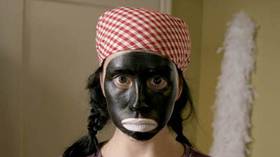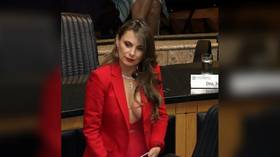Previous blackface wearers were punished for racism, Silverman was punished for satire. That’s worse

It’s one thing when political correctness commissars hunt down racist incidents, however trivial, accidental or ancient. But firing a comedian for examining race relations in America crosses the line into cultural totalitarianism.
That Sarah Silverman, one of the most outspoken liberals in American showbiz, had no intention of being racist is evident from the blackface sketch itself that she says got her recently dropped from a film. The relevant 2007 episode of her TV series can still be found online, though not on the website of its broadcaster Comedy Central, which has now excised it into official non-existence.
Also on rt.com ‘Righteousness porn’: Sarah Silverman slams ‘cancel culture’ after being fired for blackface photoIn the piece, which takes up the best part of 20 minutes, Silverman’s eponymous character, a comedic version of herself, makes a bet with a black man about who suffers more discrimination in the United States, Jews like her, or blacks like him. The two decide to settle the bet by becoming (purposely offensive) stereotypes of each other, her in blackface, and him with fake payot and an apron that proclaims “I love money.” Misadventures ensue.
Much of the humor comes from Silverman’s cluelessness as she embraces her new racial identity (“I'm beautiful Queen Latifah”) which most around her emphatically reject, outraged at her face paint. As in Ali G, a somewhat similar conceit, she is the butt of the joke. Along the way makes fun of cultural appropriation, exploitation of a self-proclaimed racial identity for victimhood (she becomes a sort of Rachel Dolezal, before Dolezal had been known) and genuine discrimination.
You don’t have to find the thing funny – the sketch is quite silly, and your mileage may vary. But it is hard to dispute this is the very essence of comedy: using anarchic play and pretense to examine serious issues, challenging normal proprieties, and provoking the audience into often uncomfortable laughter.
This is not minstrelry, where white people crudely imitate black people. This is not Virginia governor Ralph Northam standing next to klansman in his yearbook photo just a few years after real-life lynchings in the state. The humor is more sophisticated, the targets different, its intent the polar opposite.
Also on rt.com ‘One less good nurse’: Woman's firing over Beyonce costume reheats blackface debate (PHOTOS)To the executive who fired Silverman, or those who have questioned her again and again about the sketch in the past few years, none of this matters. The intent is not important as long as offense may have been taken by someone, even if it is assumed on the person’s behalf – one truly wonders how many people would have watched the recast Silverman film and gone “Wasn’t this the woman who was in that questionable sketch on an obscure show 12 years ago, how racist it is to keep casting her even though she has apologized repeatedly.”
Perhaps even more importantly, humor (or any fictional art form) gets no special exemption either. If you are not allowed to say it seriously, you can’t say it as a joke. You wouldn’t walk around in blackface in real life, so it is inappropriate to do it in a TV show sketch. The only jokes that are allowed should be in utter compliance with ordinarily acceptable political opinions and sanctioned targets. Approved topics: Donald Trump, white middle-aged men, Russians. Safer still, keep away from politics, stick to taxi services and bad Tinder dates. Doesn’t matter what your credentials are.
People can call this the death of humor, but there was a functional comedy industry in say, East Germany, or any other contemporary totalitarian state, and it wasn’t all about caricaturing capitalists, saboteurs and Western secret agents. Simply, there were some things you could joke about in public, others only in private with your friends.
While they are motivated by different concerns, the offense-taking, the literalism, and the purposeful stripping away of context are producing the same type of intellectual restrictions on comedians. A taboo-filled comedic environment where people might pull funny faces, and deliver smug monologues to loud quacking, but one that is not able to respond to the pressing concerns of the day.
Also on rt.com ‘The Hunt’ cancellation: A healthy country doesn’t ban fiction & allow real lies, hatred & violenceYou won’t find difficult but relevant questions raised in those German comedies, such as “If life in East Germany is so much better than in West Germany, why are we not allowed to leave?” or “When does Comrade Honecker plan to retire?”
Conceivably there are also huge swathes of American public life that comedians will not touch – I am sure everyone could make their own list – that are ripe for examination, even if it is from Silverman’s having-it-both-ways viewpoint.
The comedians’ job is what the internet’s anonymous meme creators are doing already, much to the chagrin of the establishment, forever chasing Pepe the Frog’s absent tail. But do liberals really want to cede challenging humor to the alt-right, turning them into the underground rebels passing around forbidden jokes, and risking unemployment and prison for them? Because if the 20th century taught us anything, is that the ideology that bans “offensive” jokes usually loses in the long run.
By Igor Ogorodnev
Igor Ogorodnev is a Russian-British journalist, who has worked at RT since 2007 as a correspondent, editor and writer.














